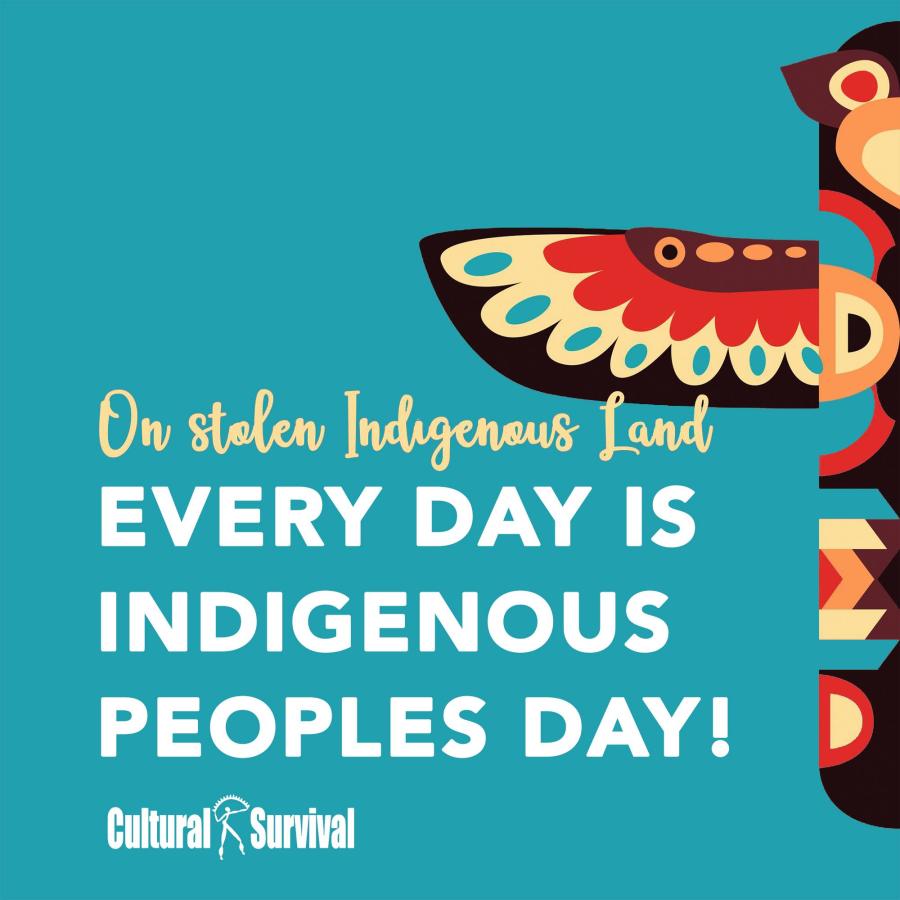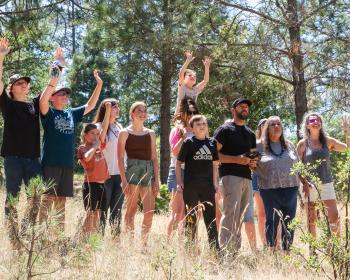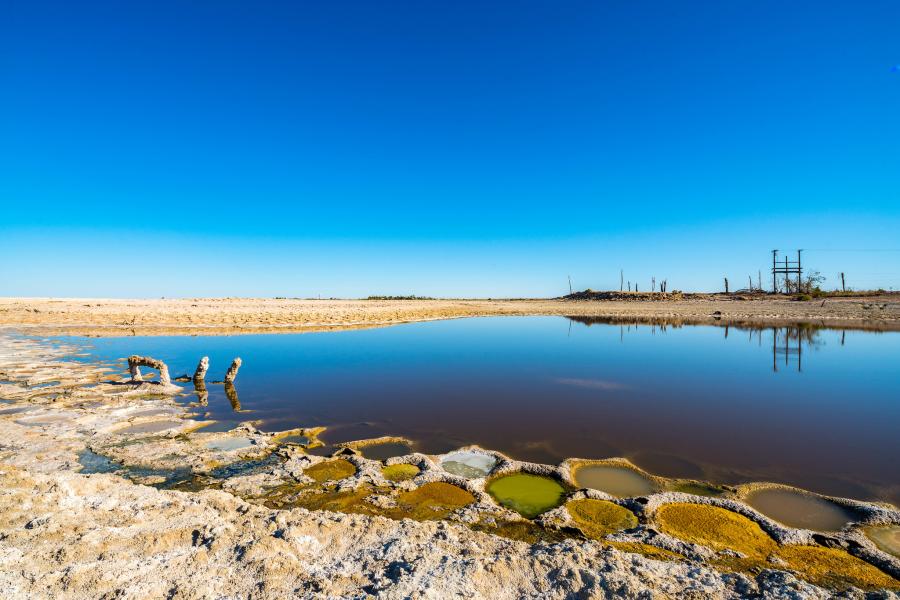
By Chad Valdez (Diné)
Coyote, or in the Diné language, Ma’ii (Muh-ee), is a trickster. But I always saw him as a storyteller. The stories that involved Coyote were always my favorite. He was sort of like a naughty child, always getting scolded by someone or having karma get him back for something he did. I liked to see the other side of it also, as I saw Coyote as someone full of stories, both about him and ones that he could tell. He is the narrator of the story below, so imagine you are at the fire with him when he stands for his turn. The story is historical fiction, so many parts of it are true, but some are not. The main character in the story, Taa Sahi Naagha, is from my imagination. But Narbona, Col. John Washington, and their deaths are real historical events. When I learned of these events I became angry, and I put that anger into this character. After finishing writing, I kept thinking of Coyote and his tricks, and it felt only right to have him be the one to tell this story.
Seeing Red
The snow continued to fall in blankets, but the fire left a dry circle that held the listeners. The murmuring quieted as Coyote stood for his turn to tell a story. He sucked in a deep breath, the air being drawn in around him, and said…
“Taa Sahi Naagha stood beside his leader, Narbona, with pride and anger as Narbona spoke to their people, the Diné. They had agreed to meet the next day with a leader of the men they had been fighting against. Narbona had riches; he was wise and a strong warrior. He earned the ears of those who listened to him through years of leadership in times of battle and peace. The clans designated him as the one who could represent them. He surrounded himself with other warriors who fought and bled beside him. Taa Sahi Naagha was one of them. Anger welled deep inside of him, however. He released that anger when he was fighting. When he wasn’t, those feelings only grew. The peace with the Americans would be good, he knew, but so many of his people had already been slaughtered, and he could not imagine not returning the same kindness they showed them.
Peace was not promised. Treaties had been signed before. But the assault of their Dinétah continued, the land bleeding alongside their people. Narbona pledged to those listening that peace would come. They would be able to sleep without the threat of fire awakening them. The next morning Taa Sahi Naagha and other warriors rode alongside Narbona to meet with Col. John M. Washington. They did not know that only a few would return.
The negotiation took a full day. Back and forth, agreements were said, then retracted. After a firm nod from both parties, they had agreed to the terms. In the year of 1849, peace was promised. Taa Sahi Naagha stepped out of the tent and watched the soldiers move around him. The air was tight with their hate for him, but still he met their gaze without surrender. Soon, Narbona stepped out smiling. He took the hand of Taa Sahi Naagha and promised things would be better now. Col. John Washington stepped out from behind him and watched them both. Those who accompanied the Colonel came out and observed the Diné warriors saddle their horses. One of the soldiers, pale, small, and loud, yelled out to one of them. He demanded that the horse the warrior was next to be given back. Confusion rang out among them all. The soldier told Washington that that horse was his and was stolen. Narbona assured him that the horse had been with them for years, each warrior caring for them for a long time, so it could not possibly be the soldier’s horse. Washington told Narbona the horse must be returned. Taa Sahi Naagha stepped in front of Narbona. He was pushed away by Narbona, who tried to reassure and calm the situation. Washington commanded his men to fire their rifles and cannons at the warriors. Seven fell, Narbona among them. Taa Sahi Naagha was held down by soldiers and beaten. They forced him to watch as they scalped Narbona. They then killed all of the horses the Navajo rode in on. The screams of Taa Sahi Naagha rang through the dirt, echoing off the mountains, repeating the scream back to them all.
Light rain pattered against the back of Taa Sahi Naagha. He turned his head to catch some in his mouth. His hands and feet were bound to keep from escaping, and he was laid on a horse sideways on his stomach. They came to a mountain pass that had a boulder protruding from overhead. Washington took most of the soldiers and rode on ahead. Three stayed with the warrior. They left him on the horse in the rain as they sat under the boulder. The moon had been above them for some time, and they finally began to fall asleep, leaving only one awake. Taa Sahi Naagha unbound his hands with ease. The rain gave him good cover. He snuck around to the soldier who sat under the boulder and watched the fire dance. His expression was empty; it seemed he thought of nothing. Quickly, hands slid around the neck of the soldier, squeezing tighter and tighter until a final raspy breath was let out into the world. A rock was picked up from out in the rain. Then a squelch of blood and water splattered against the stone cave, two screams falling alongside the rain.
Taa Sahi Naagha, translated to “He That Walks Alone,” walked. Alone. He knew some of the warriors accompanying him and Narbona had gotten away. He smiled at the thought of them gathering their weapons, the anger flowing, ready to take revenge on those who killed their newly appointed leader of the Diné. He arrived to his people and told them of what came of Narbona. They told him they knew. The others had returned and talked to Washington after everything settled and he was taken away. They thought he had died alongside Narbona. The peace treaty could still be honored, Washington told the remaining warriors. They accepted and returned here with the body of Narbona. They had already prepared him for burial. Taa Sahi Naagha became enraged.
“Peace will not come this way. They have shown us their true intentions. They still only want to kill us all. That peace they promised will not keep. We need to attack.”
They all disagreed. They would not keep fighting. Taa Sahi Naagha left to speak with his wife. He was angry, and she did what she could to calm him, reassuring him that he was not the only one feeling this way, but there was nothing to do now. She could only tell him this so many times. He kept pushing that they could go out and kill Washington, kill as many of them as they could. He would do it himself if no one would join him. His wife, desperate to help him find his own peace, told him to leave then. To leave and do what he needs to do, but to return home to her and their people. But to remember. Remember that this is not the way it should be done. They slept that night with her in his arms. He dreamt of Narbona, of the peace that he promised them all. Then his dreams became flooded with the image of Narbona being scalped by white men. These nightmares continued until the sun rose and awakened him.
Taa Sahi Naagha stood early in the morning and gathered his weapons. A spear and bow were slung around his back and two axes hung from his belt, along with a sack of water. He took another sack and filled it with dried meat. He walked towards the hill where they buried Narbona and mourned for his leader there. He told him that he knew it was not right, but he would find each of those soldiers and kill them. They did not want peace. So he would not give it to them. He took his knife from its sheath and gathered his long hair in his hands. He sawed at it until it all came loose, then dropped it on the grave.
He set out, vengeance filling his heart, tears dropping in the footprints that he left behind.
Taa Sahi Naagha killed without emotion. Any soldier or hateful cowboy he came across met his blade. He wanted them to know who he was.
Days and bodies later, he came upon a slow-flowing river. He scrubbed at his face and his arms until the dried scum came off. The blood washed down the river, far past the land he came from. The trail to him was easy to find, and he made sure of it so that any soldiers looking for him would know where to find him. They would only need to follow the crimson trail that led to him waiting. Waiting to take more of them.
On a cloudy morning, Taa Sahi Naagha rode through a desert filled with rocky hills and cacti that his horse had to slow to avoid. It was a horse he stole that was not used to being ridden off a trail. He stopped to give the horse a break when a scream broke through the silence surrounding him. He hurried to a hill, and in a valley below there was a small cabin surrounded by sheep. Men were dragging somebody with red hair out of the door. Taa Sahi Naagha watched with satisfaction. They are so quick to turn against each other, he thought. The soldiers dragged the man to a horse and tied his feet to the saddle. A woman and two children came out screaming. A soldier slapped the woman and took the kids back inside. Taa Sahi Naagha could hear the children screaming. He's not here to help, he thought. They wouldn’t have helped his women and children. He repeated that to himself as he traversed quietly down the hill until he was only a small distance from the first soldier. ‘No way to help them,’ he repeated to himself as he slit the first man’s throat. ‘No way to help them,’ he said to the next soldier he buried his axe into. ‘No way to help,’ he said as he put his knife into the stomach of the one who tied the man to the horse. No way to help.
Taa Sahi Naagha was far from home. He tracked the now disgraced Col. John M. Washington through new terrain and lands. Washington, because of internal problems with white man’s politics, was forced to leave the territory and go west to the ocean. Now he was rumored to be alone and about to be sent on a ship somewhere even further. This was the last chance Taa Sahi Naagha had. This was the moment he kept imagining to keep the nightmares of Narbona away. To keep the nightmares and voices of all the men he’s killed away. He would make it to him, and he would show Washington what not having peace was.
Washington was a man who did not travel alone. On this voyage, he was accompanied by close to 200 soldiers. Taa Sahi Naagha could not get to him before he boarded the ship. He watched as they all boarded and tried to think of a plan. The crew was waiting to board the ship as well, workers that were dirty and shaded from coal. He took a man from the line and knocked him unconscious to steal his clothes. He rubbed his face in the clothes to make it look like he was also part of the crew that worked in the innards of the ship. He boarded, was put to work, and bided his time. ‘Patience,’ he told himself. He told himself this until the ship hit a bad storm only a few days into their journey. The storm was so strong that it caused the water to lift the entire ship and then slam it down into the sea. It was going to sink. Taa Sahi Naagha ran the opposite way from the crew who were getting into life rafts. He found Washington on the deck waiting to get into a boat, but his men were choosing their lives over his. With the heavy storm, Taa Sahi Naagha easily grabbed him and dragged him back inside the ship. Fear broke through Washington’s angry gaze when he saw the face of Taa Sahi Naagha. He opened his mouth to beg, but Taa Sahi Naagha stuck a knife into his mouth. He twisted and sawed, watching for the life to leave Washington’s eyes. Once he finished, he dropped him to the ground and turned to leave, but the crashing ship continued to keep him off balance.
The storm was furious. As angry as Taa Sahi Naagha. It only did what he had been doing this whole time: it took the lives of anything that stood in its path of fury. It took everyone off the right path and kept them imbalanced. Peace would not come. The circle will not close if you cannot get off the wrong path.”
Coyote nodded his head when he finished.
One of the listeners spoke. “It has become beauty again.”
Coyote repeated it. “It has become beauty again.”
It has become beauty again.
It has become beauty again.
--Chad Valdez (Diné) is a 2023-2024 Cultural Survival Indigenous Writer in Residence.



